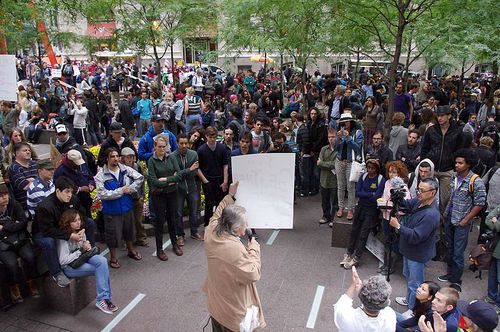
Black Youth Engage Politics and Found to be Deeply Involved in Online Politics and Social Media
National Survey Finds Young People Using New Media For Peer-based Participatory Politics, Bypassing Political Elites And Institutions
The MacArthur Research Network on Youth and Participatory Politics, with co-principal investigators Cathy J. Cohen of the University of Chicago and Joseph Kahne of Mills College, today unveiled findings from the largest nationally representative study to date of new media and politics among young people.
The national survey questioned 3,000 young people, ages 15-25 on how they use the Internet, social media, and engage in politics. The data present one of the most complete pictures to date of on this topic, providing insights on the long-term political picture in America and the upcoming 2012 election.
The study report, Participatory Politics: New Media and Youth Political Action shows that contrary to the traditional notion of a technological digital divide, substantial numbers of young people across racial and ethic groups are engaging in “participatory politics” — acts such as starting a political group online, circulating a blog about a political issue, or forwarding political videos to friends. Unlike traditional political acts, participatory acts are interactive, peer-based, and do not defer to elites or formal institutions.
“As the 2012 election approaches, it is important to realize how young people, especially youth of color, are using new media to amplify their voices in the political realm,” stated Cathy J. Cohen. “Defying conventional expectations, we found that black youth participate in online forms of participatory politics at rates equal to or slightly higher than white, Latino, and Asian American youth.”
“Anyone who cares about democracy needs to pay attention to participatory politics, which spread information, mobilize individuals to act, and provide many ways for youth to voice their perspectives,” said Joseph Kahne.
The YPP national survey and analysis of the data was supported by the John D. and Catherine T. MacArthur Foundation, whose $100-million digital media and learning initiative aims to determine how digital media are changing the way young people learn, play, socialize, and participate in civic life.
Key findings:
- Contrary to the notion of a technological digital divide, white (96%), black (94%), Latino (96%) and Asian American (98%) youth report having access to a computer that connects to the Internet.
- 43% of white, 41% of black, 38% of Latino, and 36% of Asian American youth participated in at least one act of participatory politics during the prior 12 months.
- Taking into account participatory politics, institutional politics, and voting, engagement is highest among black youth, with only 25% reporting no engagement in any form of political behavior, compared with 33% of whites, 40% of Asian Americans, and 43% of Latinos.
- Youth believe they would benefit from learning how to judge the credibility of what they find online. Survey respondents were asked, “Do you think people like you and your friends would benefit from learning more about how to tell if news and information you find online is trustworthy?”—84% said, “Yes.”
Leave a Reply